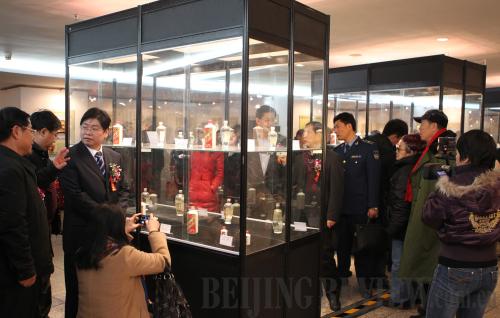|
 |
|
LIQUOR LOVE: Visitors view expensive collections at an exhibition of baijiu in Beijing on January 10, 2012 (ZHANG YANHUI) |
There is an old Chinese saying: no liquor no banquet. For locals, alcohol is an essential ingredient in spicing up celebrations.
In preparation for parties to come, consumers flock to stores and markets, buying up hordes of special purchases, including liquor, while beverage brands spare no effort in promoting sales. Among an array of choices, locals favor baijiu, clear spirits traditionally distilled from sorghum or other grains with an alcohol content of about 38 to 68 percent.
In China, producers have created a large variety of liquor over thousands of years. However, baijiu has gradually come to dominate the market.
According to an industry report published in July 2012 by China Competition Information, a market research institute and consulting service provider, baijiu output for the first half of last year increased 17.2 percent over the same period in 2011. Sales of the liquor reached 202.3 billion yuan ($32.5 billion), a year-on-year rise of 29.65 percent, denoting its popularity on the market.
For many businesspeople, the period surrounding Lunar New Year holidays is the busiest season, providing an opportunity for renewing partnerships and building new connections. "Bottoms up" is general practice at all dinner tables.
Manager of a fire extinguisher factory in Jiangsu Province Wang Changqing said the ground rules during a business dinner include getting the other party drunk before any serious talk takes place. "Whoever remains sober wins a favorable contract," he said, having already attended seven such events prior to festival time.
Wang used to manage a state-owned company before it went bankrupt in 1998, resorting to being a driver for his current employer. But he quickly moved up the ladder to again reach a managerial position in his 40s because of his capacity for liquor.
"My wife complains a lot whenever I drink too much because I never stop talking," Wang said. "But what can I do? Clients expect me to drink. How can we get the contract signed if we only sip coffee and talk about the weather?"
As a veteran of the drinking game, Wang said he can place the origin of any alcohol after only a sip. For example, liquor from Sichuan Province tastes gentle and sweet. On the contrary, that produced in north China is strong and fiery.
In China, regardless of drinking wine, beer or baijiu, people should follow certain rules.
At the dinner table, it is always the eldest or most respected who proposes the first toast and sets the measure of each drink. Guests should drain their glasses if the host does so in order to avoid offense. In many cases, the more one drinks, the more loyal a person might appear to his or her superior or business partner.
"Keep in mind," Wang said, "When clinking glasses, yours should be lower than that of the other party to show respect."
| 